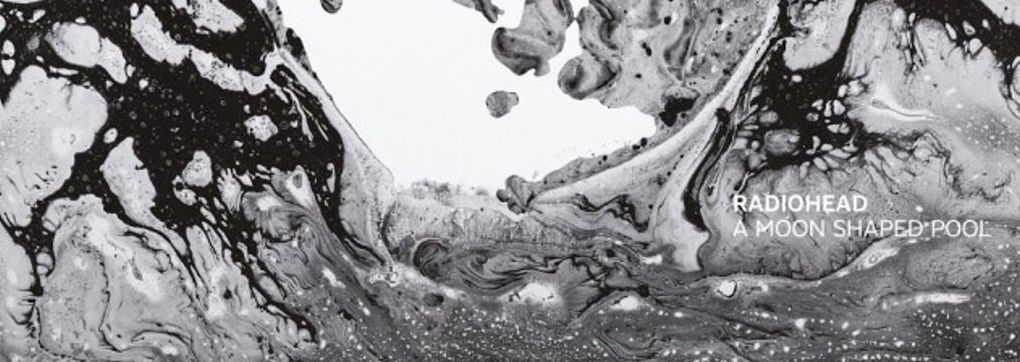Radiohead did it again and completely blew me away with their new album. After 5 years of over and over listening to The King of Limbs (2011) and other Radiohead masterpieces, A Moon Shaped Pool, their 9th studio album dropped on the 8th of May. After locking myself into a dark room for several days in order to fully enjoy and let the album grow on me, I finally feel confident about writing a review worthy of the album.
A Moon Shaped Pool is introduced with its first released single ‘Burn The Witch’ which starts with a glimmering guitar and Thom Yorke’s dream like voice, letting you drift into another dimension, higher and higher, the more sharp the violins and guitar become. This dream though escalates into a shivery nightmare in the last seconds and Yorke’s voice and its instruments literally pierce through your head in horror. A masterpiece which sets the atmosphere for the following songs. The next song’s title ‘Daydreaming’ perfectly describes its tone, transporting you onto a summer grass field with Yorke’s melancholic voice shimmering in the background. This daydream though doesn’t turn into a nightmare, but rather stays continuously dreamy and fantastic, ending with electronic sounds metaphorically letting you carry on trance like into Radiohead’s next song ‘Decks Dark’. The dreamy atmosphere is kept through the piano theme but mixed with choir voices rising up mid song, but is finally broken when the drums and bass kick in, transforming the song into a chilled rock song. ‘Desert Island Disk’ is among the less distinctive numbers (I hate myself for writing that). The song is clear and comprehensible, with less decorative bells and pianos in the background, making it more ordinary and less memorable.
‘Ful Stop’, a song that Radiohead played in their live performances in 2012 for the first time, was massively enhanced for the record. The live version suffered from its echoing sound mixing it into a chaotic blur of beats, whereas the new studio version with its threatening bass and wafting synthesiser builds up, claustrophobic and oppressive, marking the album’s height and a cut for the first part’s dream. ‘Glass Eyes’ then starts with less (positive) chaos in the background, being a very regular (a word that doesn’t describe Radiohead at all) quiet song, with its violins and piano. ‘Identikit’ is first a fairly tidy song with its rhythmic guitars and drums accompanied by Yorke’s smoothing voice, echoing in the background. But the ordinary is broken midway through a choir and later again by a guitar solo by Johnny Greenwood, which more sounds like a Nokia ringtone from the early 2000s (I also hate myself for writing that). This song is the first where I think that Radiohead would have been better off to keep to the simple. The next song is one of my favourites on A Moon Shaped Pool as ‘The Numbers’ embodies Radiohead’s artistic diversity in just over 5 minutes, starting off as a Jazz influenced piano dominated number, transferring into an atmospheric and room filling state of trance and over to a melancholic ballad accompanied by violins escalating in a emotional breakdown, setting me off rollercoaster of feelings.
Thankfully ‘Present Tense’ brought me out of the hole of emotions by being more uplifting again, letting you sway along to the melodic guitars and mysterious choir. ‘Tinker Tailor Soldier…‘s course feels similar to the album’s title, slowly closing the circular Moon Shaped Pool of light dreams and oppressive nightmares filled with emotions of fear, hope and melancholy. The album is perfected by ‘True Love Waits’, which was first played back in 1995 by Yorke with his acoustic guitar. Now, the song seems to be in his final version, finalising A Moon Shaped Pool after 21 years, because true love waits. The song stands at the end of the album as a summary of the evolution of Radiohead, clearly separated in its theme with less intrusive instruments and just pure uncovered beauty.
A Moon Shaped Pool is an album that is united by hustle in the background, the combination of bells, pianos, guitars, drums and synthesiser, creating the most melodic and quiet album of Radiohead’s career. The album stands for the uniqueness of its creators, but at the same time as a sequel to its predecessor. At the end of the emotional rollercoaster, I realise that I didn’t pay attention to any of the lyrics, but to be honest, Yorke could sing about bringing out the garbage and his voice would still put me in trance into fantasy world, creating the wildest pictures in my head (even though Radiohead’s lyrics are always full of meaning and poetic genius).
Review by Carolin Wolfsdorf
